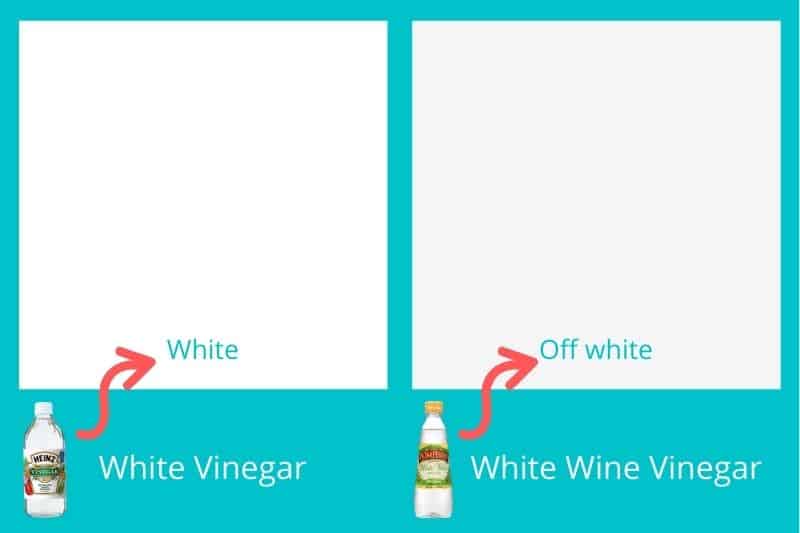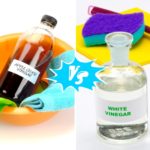The names white vinegar and white wine vinegar sound quite similar, so you could easily confuse the two together.
However, white vinegar and white wine vinegar are not the same. There are many differences between the two vinegar types and I’ll cover these below.
Difference Between White Vinegar and White Wine Vinegar
Key ingredients
The most notable difference between white wine vinegar and white vinegar is, white vinegar is created through a process known as fermenting.
This is when an alcohol based liquid, something like a grain based vodka, is broken down by acetic acid bacteria. Once this process is complete you end up with an acetic acid product, this is white vinegar.
On the flip side, white wine vinegar is made by fermenting white wine. Basically large quantities of white wine are put into these massive stainless steel vats called acetors.
When the white wine is in the vat, the ethanol in the wine gets exposed to oxygen, which in turn creates a byproduct known as acetic acid.
Water gets added to the acetic acid mix, so the end product is more palatable and less acidic in nature.
Acetic acid level
Another key difference is that white wine vinegar and white vinegar have different acetic acid level counts.
White vinegar has an acetic acid level that can reach up to 10%. While white wine vinegars’ acetic acid level is usually around 5-7%.
Although you might think that there is very little difference between these figures, there is in fact a significant difference between the two.
The higher the acetic acid content in a product the stronger it becomes. In the case of white vinegar, its high acetic acid content is what makes it an excellent cleaning product.
Smell
A good way to identify vinegar is by smelling it.
In the case of white wine vinegar and white vinegar, you will find that white vinegar doesn’t actually have a pleasant smell, in fact, it can give off quite a sour smell at times.
In contrast, white wine vinegar can have a more fruity scent, although you might find the aroma changing from one version of the product to another. The fruity smell is put down to the fact that the vinegar originated from wine, and wine usually has an appealing aroma.
Appearance
White wine vinegar and white vinegar look slightly different too.

If you go to your local supermarket you’ll notice that white wine vinegar is not actually white in colour. It’s more like an off white really, and it can sometimes look somewhat cloudy. In some cases it can also be very yellow in colour!
White vinegar is clear in comparison.
Strength
As mentioned above, white wine vinegar is not as strong as white vinegar.
However, this does not mean that white wine vinegar shouldn’t be used during cleaning. It does have its uses for particular products.
Price
There is often a price difference between white wine vinegar and white vinegar. Typically, white vinegar is cheaper, but it’s entirely up to you if you want to use the more expensive option to clean around your home.
It’s all in the name
Perhaps the most unmistakable difference between the two is the fact that they have different names. Yes, this may seem obvious, but it’s actually a huge giveaway.
Uses
Both white wine vinegar and white vinegar can be used to clean various items around the home. For example, you can clean glass, toilets and dishwashers with these products.
Nonetheless, it’s important to note that white vinegar is the better vinegar to use for cleaning because it has the higher acetic acid level, which is exactly what you need for cleaning.
Check out our article here that’ll tell you more about white vinegar.
FAQs
Is white vinegar the same as distilled malt vinegar?
The answer is no, and you can read more about the differences between the two products here.
Where can I purchase white vinegar from?
White vinegar can be bought online and from supermarkets. Check out our article that’ll be able to help you out.
I want to clean my oak floors, what vinegar should I use?
White vinegar can be used to clean your oak floors, plus it’s colourless so it won’t stain your floors either. You can follow our ‘How to clean oak floors with vinegar’ guide as well.
Conclusion
White vinegar is not the same as white wine vinegar. There are significant differences between the two vinegars, but you can use both for cleaning.
White vinegar is undoubtedly the best option for cleaning, it’s much stronger, it’s usually cheaper and it can remove tough stains with ease. But, if you want to use the more expensive white wine vinegar option instead you can do so.

Bethan has a passion for exploring, reading, cooking and gardening! When she’s not creating culinary delights for her family, she’s concocting potions to keep her house clean!






